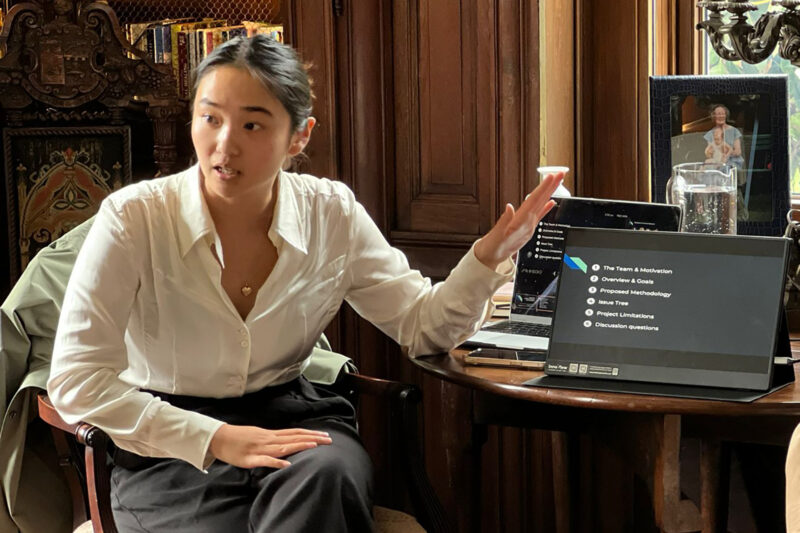Grad students Joyce Guo and Graeme Clements are leading research teams that are investigating the environmental costs of the growing semiconductor manufacturing industry and the potential impacts of U.S. sanctions on China’s efforts to develop their own supply chain.
When President Biden signed the $280 billion CHIPS and Science Act in 2022, it brought to the forefront an issue many Americans may not have previously given much consideration: the vital importance of semiconductors — “those tiny computer chips… that are the building blocks for our modern economy, powering everything from smartphones to dishwashers to automobiles,” said U.S. President Joe Biden at the signing ceremony.
Although the U.S. invented the technology, the majority of the world’s high-quality chips are produced in Taiwan. The landmark bill — which significantly boosts domestic chip production — highlights an issue that goes well beyond supply chains. Semiconductors play a critical role in processing and storing data used in the ever-growing areas of artificial intelligence and machine learning. Applications like the popular ChatGPT rely on semiconductors to manage massive amounts of data used in AI model training so the programs work effectively.
Semiconductors are also at the center of many complex geopolitical challenges. As the U.S and China vie for global power, the two countries are in a modern-day arms race to manufacture chips for use in the military and aerospace sectors, from navigation equipment to flight control systems to missile defense. The arms race is accelerated by provisions in the CHIPS Act that restrict semiconductor firms from exporting leading-edge chips to China, creating pressure on China to develop advanced internal production capabilities
“These issues will shape our world,” says Jackson grad student Joyce Guo MPP ‘24, who is among a group of Yale students working on a new research project organized by the Yale Foreign Policy Initiative, an undergraduate student organization, and supported by the Schmidt Program on Artificial Intelligence, Emerging Technologies, and National Power at the Jackson School of Global Affairs.
Guo is leading a research team of Yale undergrads tasked with exploring an often-overlooked topic: energy consumption.
“There is a steep environmental cost to the U.S. and China duplicating efforts,” says Guo, who is studying AI and the climate crisis as part of her MPP degree at Jackson. A study from Greenpeace found that semiconductor manufacturing is projected to emit 86 million tons of carbon dioxide by 2030 — more total emissions than the entire country of Portugal created in 2021.
And it’s not just manufacturing, Guo says; it’s the energy-intensive servers and data centers that power AI and machine learning. For example, she says, the energy required for the estimated 15 million daily entries into ChatGPT could power 33,000 households.
By articulating the environmental costs and finding avenues for collaboration instead of competition, the team hopes to catalyze actions that prioritize global sustainability while still unlocking the potential of AI, Guo says.
Jackson School classmate Graeme Clements MPP ’24 is also leading a research team that is examining the potential long-term impacts of the CHIPS Act on the domestic Chinese semiconductor production ecosystem.
Historically, China has sourced many of its advanced chips from Taiwan, South Korea, and the U.S. With the export provisions of the CHIPS Act now inhibiting this supply, China will face considerable urgency to develop their own semiconductor ecosystem to meet their needs.
Clements’ research team is investigating if — and how quickly — China can develop the domestic capacity to produce leading-edge chips. By identifying potential technology indigenization strategies China could use, the team hopes to create policy proposals they can present to industry leaders and government officials.
The students presented their initial findings in September at the Next Frontier Conference in Newport, Rhode Island, which brought student researchers from Yale, Oxford, Harvard and Stanford to present to leaders in business, academia, and national security. The conference was convened by Jason Hsu, a former visiting fellow at Yale Law School’s Paul Tsai China Center and a former legislator from Taiwan.
Using feedback from various stakeholders at the conference, Guo and Clements will continue to lead their research teams through the academic year.
“It’s outstanding that the Schmidt Program can sponsor student work in these critical areas,” says Ted Wittenstein, lecturer in global affairs and the executive director of International Security Studies. “Their cutting-edge research into the semiconductor supply chain and the impact of AI regulation on U.S.-China relations was featured prominently at the conference — not only building upon their academic work but potentially impacting meaningful policy in the future.”
